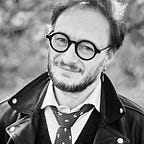About teaching games
I teach a games MA at Goldsmiths and I’d like to write something about how I teach, what are my goals and how I, in general, think about this kind of learning (it doesn’t necessarily apply to all degrees, it’s just the way I like to run it). I’d also like to share a little bit more about the course itself.
The course is called Games and Playful Design. It’s a 1 year hands-on MA focused on the practice of game design and on exploring disciplines where game design can be used and applied. The course has two core modules in game design (called Approaches to Play) which start with established game design theory, with a strong look into games created in order to explore deep topics and feelings, to move towards the exploration of other forms of expression and how they connect to game design. I look deeply into the creative process and try to motivate the students to also internalize it and know their own voice better.
I feel this process of understanding systems and connecting dots, of exploring layers of meaning, of constantly absorb and question and remix is vital for a game designer. I try to discuss ideas and review them together with the cohort. I see the teaching material not as something students need to store in their brains, but rather as starting points, intuitions, leading trails.
Besides the core modules, students can choose their own path over an array of modules ranging from game programming, narrative design, art and animation, or going a bit in a different direction, like with physical computing. The idea is to see games in a broader way. Not just videogames, but something you can physically build, or act, or exhibit in a show.
The ideal student of this MA is someone that comes from any field of creative expression and wants to understand how games work in order to add that perspective to their own practice. Video producers, artists, photographers, creative technologists tend to find a home in this program. Of course people looking for starting their own game design practice as an independent developer or employed in a studio will find the ideal place to work in.
We don’t have a formal internship period. There’s a reason for that. Actually, two reasons. First of all we are exploring a quite broad landscape and not all students have the same vision and the same goals. Some of them want to get to the industry. Some want to make art and installations which are playful and connect people. Some might want to bring their experience to different places, like interactive documentaries or tv production, social activism or immersive theatre. I take here the role of the mentor and personally follow you and try to guide you towards the best way of showing your particular take. I like to think that after the course you will be a game/playful creator with a solid understanding of your uniqueness. Knowing that will help you so much in your career.
Secondly, I feel in many cases there is a misunderstanding on the purpose of higher education. Seeing uni as something that has to get you a job (and that’s evaluated only on those terms), to me, is a bit misguided. Of course it should prepare you to approach a certain profession, but first of all, it should aim to make you a better thinker and a better person. Preparing you to approach a profession or to establish a creative practice is much different than finding you a job.
I prefer to think about fostering a community. It’s not just about what to learn, I try to make it in a way you feel you are in a nice, safe space and your voice matters, it’s understood and supported. I particularly care about this and about creating a space of kindness and mutual support. That’s why the programme is led as a studio practice: in my classes and across your final project you will work as in a studio collective, and me and all the team will help you to maximise your skills and build a strong portfolio of work. I am particularly interested in working with people from underrepresented groups. I will do my best to help your voice be heard.
This is especially important given the problems of representation and gatekeeping the industry has. I put a lot of effort into it and I try to empower people. If I have to summarize this MA in a sentence it would be something like “it helps you find your voice as a creator”.
So, here I am and here is how I want to teach game design. If I got your interest, maybe reach out to me. I would love to hear your opinions.
